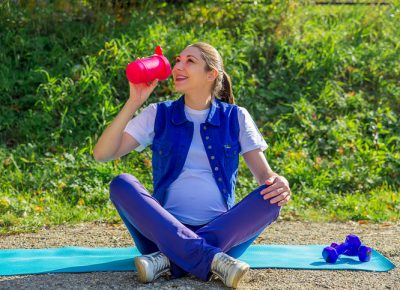Pregnancy Do’s and Don’ts

Pregnancy is such an exciting time in your life. Yet it can be filled with questions and anxiety. The reality is your actions could affect your pregnancy and your fetus. Additionally, there’s advice everywhere from experts, friends and relatives as to what you should and shouldn’t do when you’re expecting.
Here are a few evidence-based recommendations from the American College of Obstetricians and Gynecologists.
Alcohol
High alcohol intake in pregnancy has been associated with fetal malformations and developmental delay. Although data suggests that consumption of small amounts of alcohol during pregnancy does not appear to be harmful to the fetus, the exact threshold from safe to unsafe is unknown, so alcohol should be avoided.
Artificial Sweeteners
Artificial sweeteners can be used in pregnancy. Data regarding saccharin is conflicting. Low consumption is likely safe.
Caffeine
When you’re pregnant you can safely drink an 8 oz. cup of coffee or 12 oz soda daily. Exact amounts of caffeine vary, but it should be kept low-to-moderate.
Exercise and Bedrest
We encourage you to exercise regularly. If you are experiencing an uncomplicated pregnancy, we recommend that you try to achieve an average of 20–30 minutes of moderate-intensity exercise 4-5 times per week.
Fish Consumption
You should try to consume 2-3 servings of low-mercury and high-DHA fish a week. Sushi that is prepared in a clean and reputable establishment is unlikely to pose a risk.
Hair Dyes
Although data is limited on the topic, hair dye absorption is minimal and presumed to be safe during pregnancy.
Hot Tubs and Swimming
Studies show that increasing your body temperature increases your risk for miscarriage and birth defects. You should probably avoid hot tub use in the first trimester of your pregnancy. Swimming pool use is fine throughout your pregnancy.
Insect Repellents
Topical insect repellents (including DEET) can be used in pregnancy and should be used in areas with high risk for insect-borne illnesses. As a result of the risk of mosquito-borne illnesses, including West Nile and Zika virus, these insect repellents are recommended in high-risk areas. In regard to travel destinations, you should be aware of the potential infection exposures (including Zika virus) as well as available medical care at each destination.
Marijuana
Marijuana use is not known to be associated with any adverse outcomes in pregnancy. However, data regarding long-term neurodevelopmental outcomes are lacking; therefore, we recommend against marijuana usage during your pregnancy.
Nutrition and Weight Gain
The National Academy of Medicine recommends that you eat a healthy, well-balanced diet, and that you increase your caloric intake by a small amount (350-450 calories / day). However, these recommendations as well as the baseline caloric requirements are highly dependent on your activity level, height, weight, and metabolism history.
Generally, your diet should include plenty of fruits and vegetables, whole grains, dairy, and a variety of proteins. A good nutrition resource for pregnant women is this website run by the U.S. Department of Agriculture: www.choosemyplate.gov.
Oral Health
You should continue good oral health and routine dental procedures including cleanings, fillings, extractions, root canals, etc.
Other Foods
- Avoid raw and undercooked or uncooked meat.
- Wash vegetables and fruit before eating them.
- Avoid unpasteurized dairy products.
- Unheated deli meats could also potentially increase the risk of Listeria, but the risk in recent years is uncertain. Avoid foods that are being recalled for possible Listeria contamination.
Prenatal Vitamins
Prenatal vitamins are designed to meet the daily mineral and vitamin (micronutrient) requirements of most pregnant women. However, except for folic acid and possibly vitamin D and iron, it is unknown whether meeting recommended dietary allowances improves outcomes or that failing to meet these recommended allowances worsens outcomes. Additionally, for women with well-balanced, nutritious diets that meet the recommended allowances, supplementation is likely not required. If supplementation is required, there is no known best formulation. A simple multivitamin will normally suffice, including nonprescription vitamins.
Seat Belts
You should continue to use three-point seatbelts when you travel in an automobile. The lap belt should be placed across the hips and below the uterus. Although there is potential for injury from a seatbelt, the risk is low and, because seatbelts significantly reduce the risk of major injuries from collisions, the overall effect is beneficial. Do not disable the airbags.
Sexual Intercourse
If you’re not experiencing bleeding, placenta previa at greater than 20 weeks of gestation, or ruptured membranes, you should be able to enjoy intimacy with your partner.
Sleeping Position
There is conflicting data about sleeping on your back and stillbirth. You can sleep on your side but know that side-sleeping does not prevent stillbirth.
Smoking, Nicotine, and Vaping
You should not smoke cigarettes during pregnancy. If you are unable to quit entirely, you should reduce it as much as possible. Since vaping devices still contain nicotine, the harm to pregnancy and baby is still possible, even beyond addiction. Consequences include but are not limited to preterm birth and low birth weight, common causes for infant death. Nicotine replacement (with patches or gum) is appropriate as part of a smoking cessation strategy.
Travel
Airline travel is safe in pregnancy. Pregnant women should be familiar with the infection exposures and available medical care for each specific destination. We won’t tell you not to travel, but you should weigh the balance of the benefit of the trip with the potential of a complication during travel.





